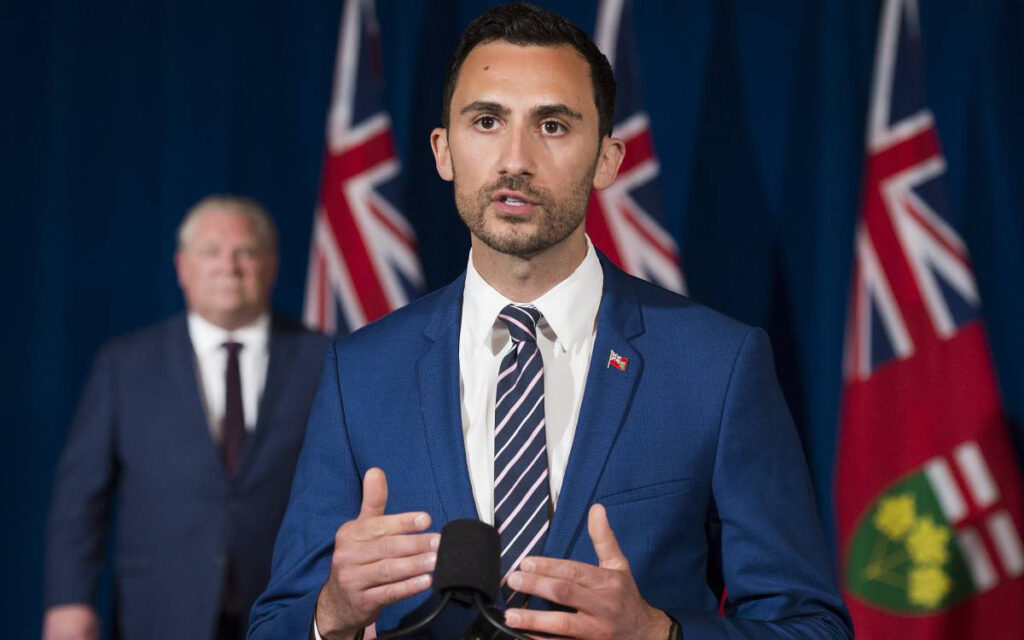
Over to one side, almost under the radar, Education Minister Stephen Lecce has been steadily, but surely, moving an important education reform agenda forward. And in the long term, it will pay significant economic and social dividends as hopefully, our students emerge more prepared for the challenges of life and the workplace. Pictured: Stephen Lecce. Photo Credit: Canadian Press/Nathan Denette.
The provincial education file can usually be counted on to generate controversial front-page headlines for a government. Disputes between governments of all political stripes and teacher unions seem never ending.
But in recent months, most of the media attention the Ontario Government has received has been dominated by issues like homelessness, the funding crisis in postsecondary institutions, immigration, the controversial “Greenbelt” legislation, antisemitism demonstrations and strains on the health care system, to name a few.
Important matters to be sure and ones requiring much of Ontario Premier Doug Ford’s time.
But over to one side, almost under the radar, Education Minister Stephen Lecce has been steadily, but surely, moving an important education reform agenda forward. And in the long term, it will pay significant economic and social dividends as hopefully, our students emerge more prepared for the challenges of life and the workplace.
As this space has noted before, cabinet ministers often get moved from portfolio to portfolio for various political reasons. Lecce, on the other hand, has had the benefit of staying put for five years, giving him an opportunity to actually deliver on the government’s long-term education agenda.
His most recent announcement was the launch of a new “back-to-basics” kindergarten curriculum with two main objectives – improving students’ literacy and math abilities by ensuring they start school with strong foundational skills; and fixing the weaknesses in the previous Liberal administration’s “play-based” approach to learning as opposed to more structured teaching.
The moves respond to students’ declining literacy and math scores on various standardized assessments and the improvements are also designed to improve outcomes for children with various learning disabilities, such as dyslexia.
In a recent report, the Ontario Human Rights Commission was highly critical of the existing curriculum, saying that it was failing higher needs students.
The new, more structured approach will also be supported by expanded early screening to identify struggling students and additional funding for 400 more specialist teachers to help them.
The announcement certainly had its critics from the Opposition parties – this is the education file after all – but it was also supported by leaders from the Canadian Children’s Literacy Foundation, the Child Development Institute and the Human Rights Commission itself.
It should also be noted that the Minister will consult with stakeholders over the next few months to fine tune the changes before they are introduced in the spring of 2025.
These changes follow on two other important and timely reforms Lecce has launched.
He is improving the “civics and careers” course, originally introduced by the previous Progressive Conservative government of Mike Harris to promote students’ understanding of democracy and citizenship.
Unfortunately, over the past few years, the course has deteriorated into what Lecce described as a “bird course,” in other words, a course students consider to be an easy, waste of time.
Speaking to a recent Democracy Forum at Toronto Metropolitan University, he told the audience he was returning the curriculum to its original goal, to ensure students had a better understanding of their system of government and why it is so important, particularly in the current era.
He will also introduce new curriculum to ensure students know about and understand the importance of both the Holocaust – when six million Jews were deliberately killed by Germany’s Nazi government – and the Holodomar – when four million Ukrainians were deliberately starved to death by the old Soviet Union.
Toronto Star columnist, Martin Regg Cohn, who moderated the forum, reported that Lecce considers such knowledge to be a defense against the current political extremism and disinformation students are being increasingly exposed to.
So let the media continue to focus on the day’s current controversies and leave Lecce to continue his task of improving education.

Janet Ecker is a former Ontario Finance Minister, Minister of Education, Minister of Community and Social Services and Government House Leader in the governments of Premier Mike Harris and Premier Ernie Eves. After her political career, she served as the founding CEO of the Toronto Financial Services Alliance, a public-private partnership dedicated to building Toronto region into an international financial centre. She currently sits on a number of corporate and non-profit boards, agencies and advisory committees.
Ms. Ecker received the Order of Canada for her public service contributions and was recognized as one of the “Most Influential People in the World’s Financial Centres” by Financial Centres International. She also received a “Canada’s Most Powerful Women: Top 100 Award” from the Women’s Executive Network and the Richard Ivey School of Business, among other awards. She is also one of the founders of Equal Voice, a national, multi-partisan organization working to elect more women.




















